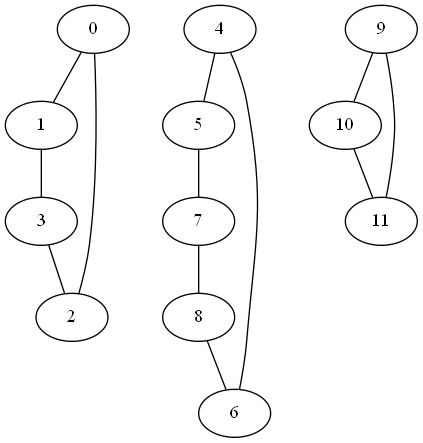Boost.Graphには、boost::isomorphism()(アイソモルフィズムと読む)という、2つのグラフが同型かを調べる関数が用意されています。
以下の2つのグラフが同型かどうかを調べてみます。この2つは、頂点の順番等は異なってますが、同じ形のグラフです。
#include <iostream> #include <vector> #include <utility> #include <boost/graph/isomorphism.hpp> #include <boost/graph/adjacency_list.hpp> typedef boost::adjacency_list<boost::listS, boost::vecS, boost::undirectedS> Graph; const int vertex_count = 12; Graph make_graph1() { const std::vector<std::pair<int, int>> edges = { { 0, 1}, { 1, 2}, { 0, 2}, { 3, 4}, { 4, 5}, { 5, 6}, { 6, 3}, { 7, 8}, { 8, 9}, { 9, 10}, {10, 11}, {11, 7} }; return Graph(edges.begin(), edges.end(), vertex_count); } Graph make_graph2() { const std::vector<std::pair<int, int>> edges = { { 9, 10}, {10, 11}, {11, 9}, { 0, 1}, { 1, 3}, { 3, 2}, { 2, 0}, { 4, 5}, { 5, 7}, { 7, 8}, { 8, 6}, { 6, 4} }; return Graph(edges.begin(), edges.end(), vertex_count); } int main() { const Graph g1 = make_graph1(); const Graph g2 = make_graph2(); const bool result = boost::isomorphism(g1, g2); std::cout << "isomorphic? " << std::boolalpha << result << std::endl; }
isomorphic? true
trueが返ってきたので、g1とg2が同型であることがわかりました。
参照:
boost::isomorphism() - Boost Graph Library

